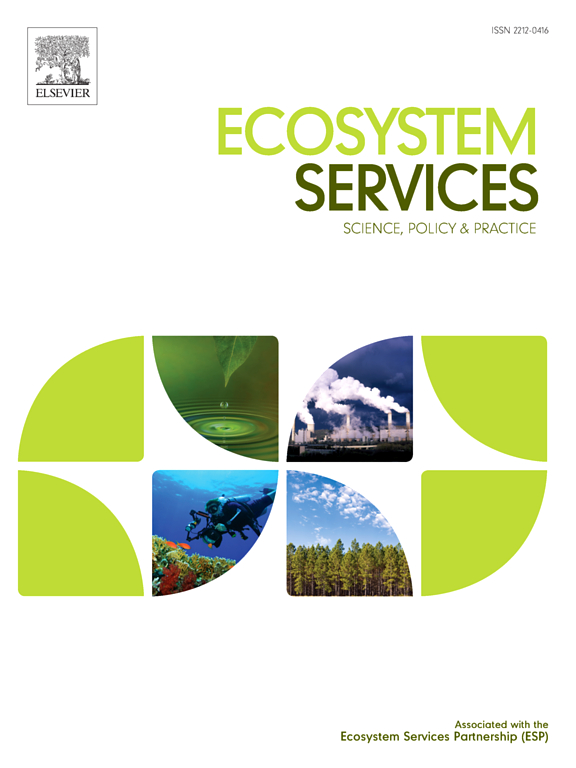One-question interviews elucidate nuances in diverse values of coral reefs in West Hawaiʻi
IF 6.6
2区 环境科学与生态学
Q1 ECOLOGY
引用次数: 0
Abstract
Considering diversity of non-material values of nature in environmental management can improve equity outcomes of management actions. But research on non-material values faces many challenges, including (1) how to balance the richness of qualitative analyses with the summative power from quantitative analyses; (2) how to phrase questions that elicit meaningful information without leading study participants; and (3) how to understand the diversity of people’s experiences of nature-related values.
We explored the potential of one-question interviews, a modified version of the freelisting method, to confront these challenges. We asked 330 individuals on reef-adjacent beaches in West Hawaiʻi one of two questions to (1) test the efficacy of the method to elucidate both quantitative and qualitative differences between different user groups’ non-material values; (2) test how question choice might impact results; and (3) identify differences in the values mentioned by residents vs. non-residents and Native Hawaiians vs. non-Native Hawaiians. We found that one-question interviews gather meaningful and complementary information on non-material values, and that question choice matters: the two questions yielded different proportions of mentions of non-material values. Finally, controlling for question type, we found significant differences in which values were mentioned by participants of different backgrounds, as well as qualitative differences in how participants of different backgrounds discussed the same values.
Our findings suggest that one-question interviews generate a mix of qualitative and quantitative data which can reveal nuances that might be missed if only surveys or long-form interviews are used. Data obtained with this approach can contribute to recognition justice and help address equity concerns associated with managing a resource based on a particular value set, particularly when they are conflicts between users. These findings can inform management and studies of non-material values in diverse contexts.
一个问题的访谈阐明了西夏威夷夏威夷珊瑚礁不同价值的细微差别
在环境管理中考虑自然非物质价值的多样性可以提高管理行为的公平性。但非物质价值研究面临诸多挑战,包括:(1)如何平衡定性分析的丰富性与定量分析的总结性;(2)如何在不引导研究参与者的情况下提出问题,以引出有意义的信息;(3)如何理解人们与自然相关的价值观体验的多样性。为了应对这些挑战,我们探索了单问题访谈的潜力,这是自由列表方法的改进版本。我们在夏威夷西部珊瑚礁附近的海滩上询问了330个人,其中有两个问题:(1)测试该方法的有效性,以阐明不同用户群体的非物质价值之间的定量和定性差异;(2)检验问题选择对结果的影响;(3)识别居民与非居民、夏威夷原住民与非夏威夷原住民所提到的价值观的差异。我们发现,一个问题的访谈收集了非物质价值的有意义和补充的信息,问题的选择很重要:两个问题产生了不同比例的提到非物质价值。最后,在控制问题类型的情况下,我们发现不同背景的参与者所提到的价值观存在显著差异,不同背景的参与者讨论相同价值观的方式也存在质的差异。我们的研究结果表明,一个问题的访谈产生了定性和定量数据的混合,可以揭示如果只使用调查或长形式访谈可能会错过的细微差别。使用这种方法获得的数据有助于识别的公平性,并有助于解决与基于特定值集管理资源相关的公平性问题,特别是当它们是用户之间的冲突时。这些发现可以为不同背景下的非物质价值的管理和研究提供信息。
本文章由计算机程序翻译,如有差异,请以英文原文为准。
求助全文
约1分钟内获得全文
求助全文
来源期刊

Ecosystem Services
ECOLOGYENVIRONMENTAL SCIENCES&-ENVIRONMENTAL SCIENCES
CiteScore
14.90
自引率
7.90%
发文量
109
期刊介绍:
Ecosystem Services is an international, interdisciplinary journal that is associated with the Ecosystem Services Partnership (ESP). The journal is dedicated to exploring the science, policy, and practice related to ecosystem services, which are the various ways in which ecosystems contribute to human well-being, both directly and indirectly.
Ecosystem Services contributes to the broader goal of ensuring that the benefits of ecosystems are recognized, valued, and sustainably managed for the well-being of current and future generations. The journal serves as a platform for scholars, practitioners, policymakers, and other stakeholders to share their findings and insights, fostering collaboration and innovation in the field of ecosystem services.
 求助内容:
求助内容: 应助结果提醒方式:
应助结果提醒方式:


